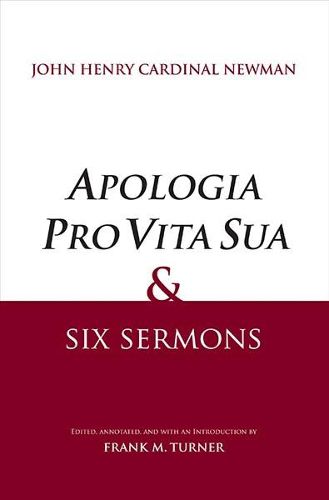Readings Newsletter
Become a Readings Member to make your shopping experience even easier.
Sign in or sign up for free!
You’re not far away from qualifying for FREE standard shipping within Australia
You’ve qualified for FREE standard shipping within Australia
The cart is loading…






This newly edited version of John Henry Newman’s Apologia Pro Vita Sua sheds new light on Newman’s celebrated account of his passage from the Church of England to the Roman Catholic Church and repositions his narrative within the context of transformative religious journeys of other Victorian intellectuals. Frank M. Turner is the first historian of Victorian thought, religion, and culture to edit Newman’s classic autobiographical narrative. Drawing on extensive research in contemporary printed materials and archives, Turner’s powerfully revisionist Introduction reevaluates and challenges the historical adequacy of previous interpretations of Newman’s life and of the Apologia itself. He further presents Newman’s volume as a response to ultramontane assertions of papal authority in the l860s.
In addition to numerous explanatory textual annotations, the volume includes an Appendix featuring six important Anglican sermons that providesignificant insights into Newman’s thought during the years recounted in the Apologia.
$9.00 standard shipping within Australia
FREE standard shipping within Australia for orders over $100.00
Express & International shipping calculated at checkout
Stock availability can be subject to change without notice. We recommend calling the shop or contacting our online team to check availability of low stock items. Please see our Shopping Online page for more details.
This newly edited version of John Henry Newman’s Apologia Pro Vita Sua sheds new light on Newman’s celebrated account of his passage from the Church of England to the Roman Catholic Church and repositions his narrative within the context of transformative religious journeys of other Victorian intellectuals. Frank M. Turner is the first historian of Victorian thought, religion, and culture to edit Newman’s classic autobiographical narrative. Drawing on extensive research in contemporary printed materials and archives, Turner’s powerfully revisionist Introduction reevaluates and challenges the historical adequacy of previous interpretations of Newman’s life and of the Apologia itself. He further presents Newman’s volume as a response to ultramontane assertions of papal authority in the l860s.
In addition to numerous explanatory textual annotations, the volume includes an Appendix featuring six important Anglican sermons that providesignificant insights into Newman’s thought during the years recounted in the Apologia.